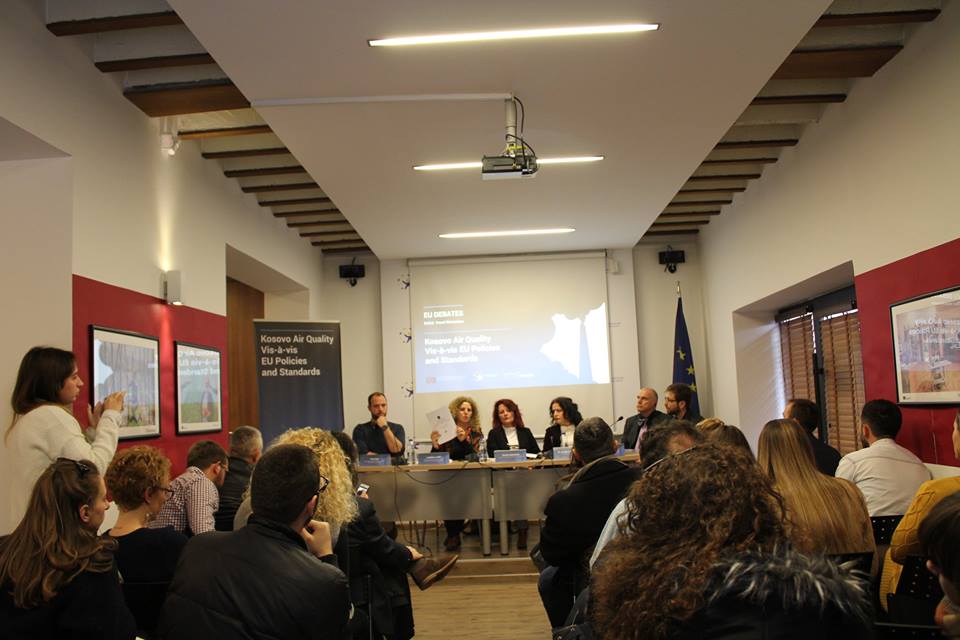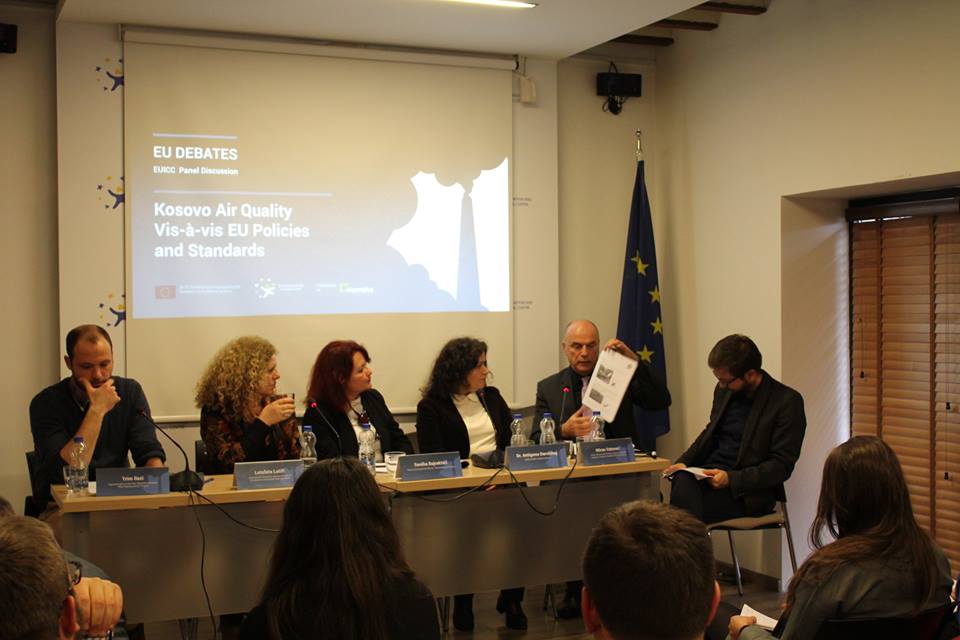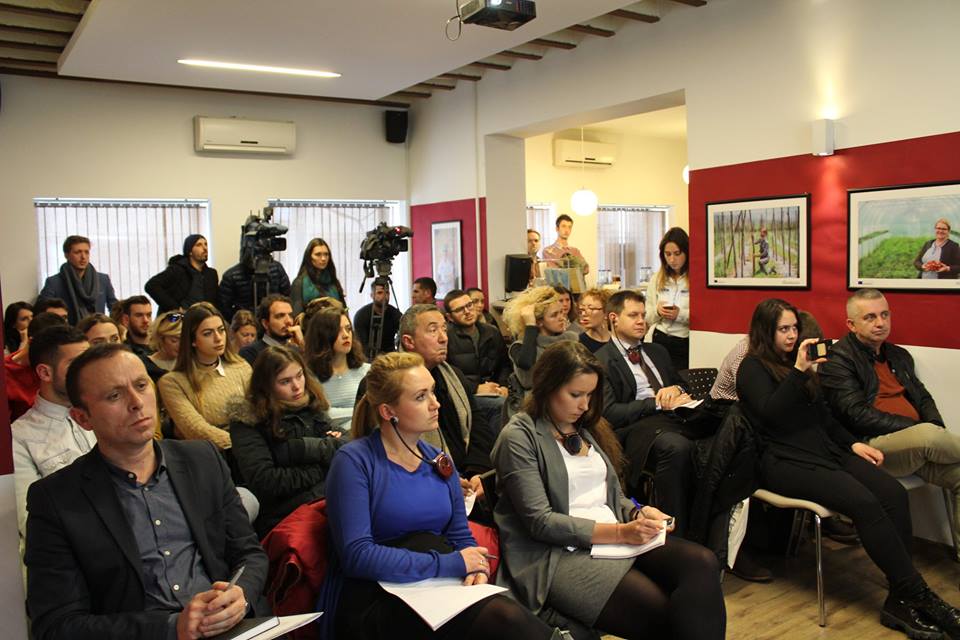January 31, 2017 | Tuesday
During the last months of 2016, the hottest topic in Kosovo media and social media was air quality in Pristina. Enormous ciphers of air pollution, as reported daily by the measurements of the US Embassy, which are available for all citizens, have caused national outrage about the lack of institutional reaction. As a result, there have been TV debates on the topic, an increased frequency of media reporting on the environment, and CSO initiatives, including the protest held by the civic initiatives to alert on air pollution.
To reflect on the current situation of air pollution, the EU information and Cultural Centre in Pristina organized a panel discussion on the topic of “Kosovo air quality vis-à-vis EU policies and standards” on 19 January 2017, whereas the panel speakers presented and discussed on institutional reaction and all inclusive measures to tackle this problem, EU policies and laws on air quality, as well as civic initiatives to raise awareness on the hazardous situation of air pollution.
The need to hold this panel discussion also derives from the concerns and recommendations by the 2016 progress report, which stipulates that Kosovo is at an early stage of preparation in the environmental and climate change areas. Among others, the report suggests that institutions should pay attention on ensuring real-time measurements and reporting of air quality. The national strategy for air quality and the law on ambient air quality were adopted but need to be enforced.
Miran Vatovec, the EU Office representative from the Political, Economic and EU Integration Section highlighted the fact that the actual index of air quality in Kosovo indicates a highly polluted environment and hence it is a pressing issue to widely raise awareness on this. Vatovec presented the newly adopted EU directive on air quality with a purpose to reduce harmful emissions. This directive sets new national reduction commitments for main pollutants, responsible for acidification, eutrophication and ground level ozone pollution which leads to negative impact on human health and environment. Vatovec mentioned that air pollution is now a major concern in all EU member states which was the reason for newly adopted legislative measures, whereas the main polluters in Kosovo being the congested city transport, energy infrastructure-thermal power plants, burning wood and waste in households as well as use of fertilizers in agriculture.
“Kosovo should follow the EU approach on should coordinating the plans and actions on transport, agriculture and climate change policies, as they are considered to have a big impact on the air quality. The constant monitoring itself will not solve the problem. In order to improve the situation we must take concrete short time and longtime measures,”concluded Vatovec.
The municipality of Pristina presented their self-initiated plan of measures to react to the current situation of air pollution. The municipal authorities have placed six sensors in different locations in town where the air quality is measured real time and the figures can be found on their official webpage for all citizens to check. One of the measures undertaken by the municipality is operation of new public transport buses with EUR6 emission standard, expanding of green spaces in the city, regulating of city urban planning by preventing illegal construction and the co-generation plan to connect the entire city with the public central heating to reduce the use of harmful burning fuels.
Doctor AntigonaDervishaj of the Public Health Institute of Kosovo brought attention to the long term impact of air pollution andserious implications this can have on public health. The main polluters according to Dervishaj are coal-basedpower plants especially in the capital city considering the fact that the power plant is located in the distance of only five kilometers from the residential area. The Public Health Institute does systematically inform the wide public on the protection measures for citizens and the harmful effects of high level of air polluters.
The representative of the Environment Protection Agency, LetafeteLatifi elaborated the National Action Plan prepared by the Agency in cooperation with other institutions at the government level to tackle the alarming situation of air pollution such as raising awareness on protection from air pollution, preparation of adequate guidelines to advice the population and their constant monitoring of air quality index in correlation with US embassy. The latest Plan of Measures on improving the air quality and environmentby the Ministry of Environment and Spatial Planning, has been adopted by the government on 21 December last year, and it includes short term, medium-term and long term measures to bring down the pollution level.
Besides the institutional initiatives and preventive measures, the panel presented the non-institutional or civic initiatives on air pollution such as the “Making Sense EU” project, implemented by Peer Educators Network PEN and Science for Change Kosovo Movement. Trim Ilazi, the project representative draw attention on the importance of having citizens on board who will also measure the air quality index independently and not to rely on institutional sources all the time. Ilazi criticized the official approach on measurements and how it lacks the scientific perspective and module variations in regard to the locations and timing of the measurement.
The discussion concluded that there should be multilateral efforts by all parties involved to implement the legislation and policies on air quality in place, in accordance with the EU standards, as well as intensify the communication with the citizens, recommending all institutions to become more active in raising awareness in regard to the environment. This would increase citizen participation in the policy making process, but also promote furthercivic incentives on reducing air pollution.


